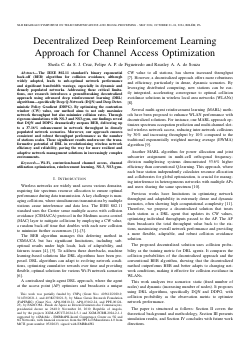
Decentralized Deep Reinforcement Learning Approach for Channel Access Optimization
Sheila Cássia Da Silva Janota, Felipe Augusto de Figueiredo, Rausley Adriano Amaral de Souza
DOI: 10.14209/sbrt.2024.1571032910
Evento: XLII Simpósio Brasileiro de Telecomunicações e Processamento de Sinais (SBrT2024)
Keywords: Deep Reinforcement Learning wi-fi medium access NS-3
Abstract
The IEEE 802.11 standard's binary exponential backoff (BEB) algorithm is the prevailing method for tackling the collision avoidance problem. With the BEB, the backoff period increases each time a collision occurs, aiming to minimize the likelihood of subsequent collisions. However, this provides suboptimal results degrading network performance and leading to bandwidth wastage, especially in dynamic dense networks. To improve this, the paper proposes using a decentralized approach with deep reinforcement learning (DRL) algorithms, specifically Deep Q Learning (DQN) and Deep Deterministic Policy Gradient (DDPG), to optimize the contention window (CW) value and maximize throughput while minimizing collisions. Simulations with the NS-3 simulator and NS3-gym toolkit show that DQN and DDPG outperform BEB in both static and dynamic scenarios, achieving up to a 37.16\% improvement in dense networks.Download